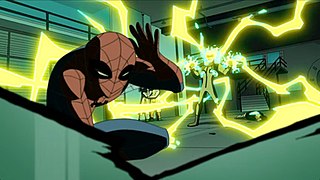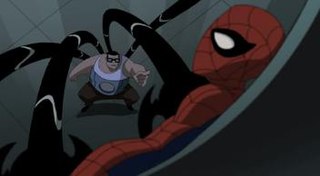Heisenberg's uncertainty principle is a fundamental concept in quantum physics.
Contents
Uncertainty principle may also refer to
Heisenberg's uncertainty principle is a fundamental concept in quantum physics.
Uncertainty principle may also refer to
Invincible may refer to:
Reaction may refer to a process or to a response to an action, event, or exposure.

Spider-Man, also known as Spider-Man: The Animated Series, is an American superhero animated television series based on the Marvel Comics superhero of the same name. The series aired on the Fox Kids Network from November 19, 1994, to January 31, 1998, for a total of five seasons comprising 65 episodes, and ran reruns on Toon Disney's Jetix block and on Disney XD. The series was produced by Marvel Films and animated by TMS-Kyokuichi.

Peter MacNicol is an American actor. He received a Theatre World Award for his 1981 Broadway debut in the play Crimes of the Heart. His film roles include Galen in Dragonslayer (1981), Stingo in Sophie's Choice (1982), Janosz Poha in Ghostbusters II (1989), Gary Granger in Addams Family Values (1993), Renfield in Dracula: Dead and Loving It (1995), and David Langley in Bean (1997).
Partner, Partners, The Partner, or, The Partners may refer to:

Silvermane is a supervillain appearing in American comic books published by Marvel Comics. A notorious crime boss and prominent figure in the Maggia, a fictional organized crime syndicate, he is usually depicted as an adversary of the superhero Spider-Man and the father of Joseph Manfredi. Silvermane later became a cyborg in an attempt to extend his lifespan.

Greg Weisman is an American writer, producer and voice actor. He is best known as a creator of the animated series Gargoyles, The Spectacular Spider-Man and Young Justice. He is also known for being the supervisory producer for the second season of W.I.T.C.H..
Spider-Ham is a superhero appearing in American comic books published by Marvel Comics. The character is an anthropomorphic pig and is a cartoon animal parody version of Spider-Man. He was created by Larry Hama, Tom DeFalco, and Mark Armstrong.

The Scarlet Spider is an alias used by several fictional characters appearing in American comic books published by Marvel Comics, most notably Ben Reilly and Kaine Parker, both of whom are genetic replicates of the superhero Spider-Man.

The Spectacular Spider-Man is an American superhero animated television series developed by Victor Cook and Greg Weisman and produced by Sony Pictures Television, based on the Marvel Comics character Spider-Man. In terms of overall tone and style, the series is based primarily on the Stan Lee, Steve Ditko and John Romita Sr. era of The Amazing Spider-Man, with a similar balance of action, drama and comedy as well as a high school setting. However, it also tends to blend material from all eras of the comic's run up to that point in addition to other sources such as the Ultimate Spider-Man comics by Brian Michael Bendis and Mark Bagley, as well as Sam Raimi's Spider-Man film trilogy.
Survival of the fittest is a metaphor related to the biological theory of evolution.
Framed may refer to:
The Invisible Man is an 1897 novel by H. G. Wells.
Big Time or The Big Time may refer to:
Prodigy, Prodigies or The Prodigy may refer to:

"Interactions" is the second episode of the animated television series The Spectacular Spider-Man, based on the comic book character Spider-Man created by Stan Lee and Steve Ditko. The episode sees Spider-Man confronting the supervillain Electro, whose body was corrupted with electricity after a freak lab accident.

"Reaction" is the eighth episode of the American animated television series The Spectacular Spider-Man, which is based on the comic book character Spider-Man, created by Stan Lee and Steve Ditko. The episode originally broadcast in the United States on the Kids WB! block for The CW on May 3, 2008.

"Catalysts" is the seventh episode of the animated television series The Spectacular Spider-Man, which is based on the comic book character Spider-Man, created by Stan Lee and Steve Ditko. The episode sees Spider-Man trying to stop the psychotic supervillain Green Goblin from bombing a dinner party filled with high-class New York citizens on the night of his school's big Fall Formal.

"The Uncertainty Principle" is the ninth episode of the animated television series The Spectacular Spider-Man, which is based on the comic book character Spider-Man, created by Stan Lee and Steve Ditko. It originally aired on the Kids WB! programming block on The CW Network on May 10, 2008.
Final Curtain may refer to: